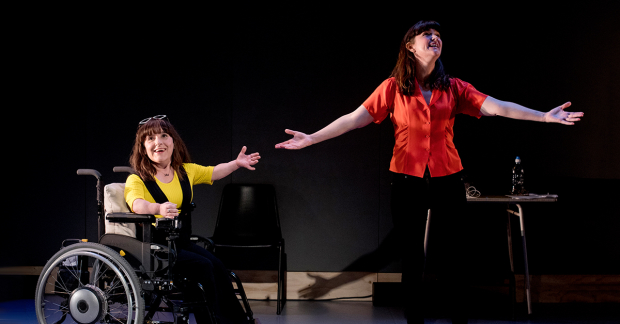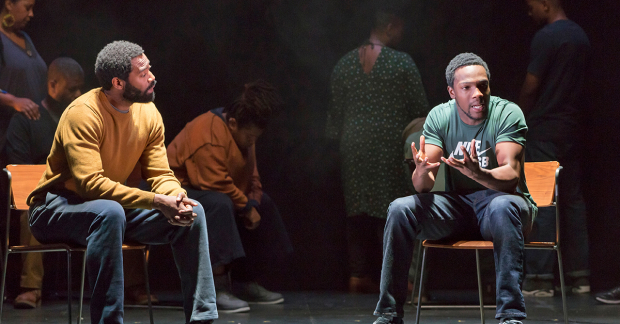Review: Still No Idea (Royal Court)

© Camilla Greenwell
Lisa Hammond and Rachael Spence have no idea what show they want to make. Alone on Ben Stones' empty stage in the Jerwood Upstairs space at the Royal Court, they re-play their recorded attempts to go out onto the streets and ask members of public what would be an ideal plot for a two-hander – with some eyebrow-raising results.
Still No Idea, the spiritual and thematic successor to Improbable's 2009 show No Idea (also performed by the pair), is a part-stand-up routine, part-verbatim, part-improv piece that starts small but ends with some huge implications. It takes the meta-theatrical conundrums of two performers and transforms them into a meditation not just on the treatment and perception of disability within the arts, but also within the wider, post-austerity Britain where policies and oversights have tragically affected thousands of lives.
As Hammond and Spence cycle through the various, contrived plots created for them by members of the public ("you could be a famous dancer who falls in love with a doctor!", "you could visit a haunted house and be part of a satanic ritual!"), it becomes clear that audiences have no idea either how to bring disability into a narrative, or, alternatively, just ignore it all together and create a story without it being featured. Hammond is constantly defined either by her wheelchair or by her "cheeky face" (the pair creating a great, tongue-in-cheek song with the same name). First impressions are insurmountable.
But as Hammond and Spence highlight, the problem isn't just with the public. As much as theatres and TV studios like to pat themselves on the back for their inclusivity, the difference between symbolic gestures and genuine initiative is large. One particularly powerful (and largely biographical) moment sees Hammond reflect on her four-year stint on a well-known, east-end soap (not named in the show), where, despite repeated promises, she was never given a fully-formed plot of her own. She was just present to tick a box.
Hammond and Spence are sincere, incessantly funny and have the rapport perfectly suited to leaping from humour to pathos in a matter of minutes. Alongside creator Lee Simpson they begin with whimsy and end with startling clarity, showing to what degree things have changed since 2009 (rarely for the better) – at one point stopping the performance to project the names of those who committed suicide or died after being unjustly declared fit for work.
In this charged conclusion, the crux of the show is revealed. The increasing – but not nearly enough, and rarely well-conceived – visibility of disabled performers on screens and stages does not make up for the constant invisibility of those who have suffered under austerity and benefit blunders. Essential viewing.
















